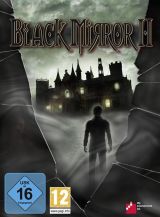Review for Unavowed
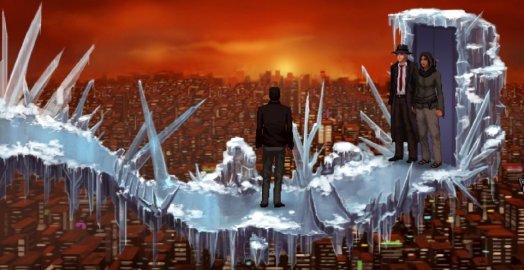
I’ve been a longtime fan of Wadjet Eye’s Blackwell series. Over the course of five installments that continually grew in length and complexity of both story and characters, each game tried something new while remaining comfortingly familiar. After the emotionally-charged ending of the final game, I heard that designer Dave Gilbert was done with Blackwell and moving onto something new, leaving me both excited and trepidatious. Could Gilbert capture lightning in a bottle twice? Could he conjure forth more characters with the depth of Rosa Blackwell and her spirit guide Joey? Could he devise even more interesting scenarios to investigate? With his latest 2D point-and-click adventure, Unavowed, the answer to all those questions is a resounding yes!
Set in present day New York, Unavowed opens right in the thick of the action. You’ll find yourself on a rooftop in the middle of a downpour, appearing for now only as a silhouetted character. Someone restrains you while a man in a fedora and long coat throws lightning bolts at you. It quickly becomes apparent that they’re trying to exorcise an evil spirit from your body.
During this introductory sequence, the game cleverly lets you select personal details about your character that will carry through right to the finale. Through a series of questions posed with the command that you remember who you are, you get to choose your gender, name, and occupation. At this point, events flash back to one year previously. Based on the occupation you picked, you’ll experience one of three different playable character introductions that lead up to where the evil spirit takes control of you.
Depending on your preference, you can play as a sympathetic bartender who has to get a suicidal drunk out of the bar’s bathroom. Or you might go the route of being a rookie detective investigating an overweight cop at a Goth club who has suddenly taken on Bruce Lee capabilities, at least according to all the witnesses. Or you can even take the path of an actor in a play whose director has suddenly been struck by the creative muse and is rewriting the entire script – a week before opening night.
Your choice of profession doesn’t just impact the beginning of the story, to a degree it also affects the way you tackle different challenges throughout the game. The bartender, for example, is endowed with a great deal of empathy and is seen as trustworthy by other characters. You can use these abilities to get people to open up and share things they wouldn’t tell the other personas. The detective, on the other hand, can get on with other cops and has a good eye for detail during investigations. The actor, as one would expect, is good at deception, which can be used to bluff your way through several situations.
Once you remember who you are and how you were possessed, the game returns to present day as the evil spirit is finally cast out. You’ll learn that the man in the coat is one Eli Beckett and the woman restraining you is the sword-wielding Mandana. The two work for a clandestine group known as the Unavowed, describing themselves as “the wall against the darkness,” a group of supernatural police who keep an eye on all the demons, evil spirits and other magical forces that sometimes bleed through into our reality from other dimensions. Over the past year, the number of such occurrences has been on the rise. Most humans – dubbed “mundanes” here – don’t see or acknowledge these paranormal threats. However, due to your recent possession your character is “void touched,” meaning you can see the monsters. With this second sight, you are invited to join the Unavowed to help hunt down the spirit that possessed you.
The New York group is overseen by Kalash, an immortal jinn who founded the branch four hundred years previously. Mandana is Kalash’s half-human, half-jinn daughter, who learned to use a sword from her deceased mother and is the most physically fit of the Unavowed, capable of climbing and jumping to areas that others can’t reach. Like her father, Mandana is incapable of telling a lie and can sense untruths when spoken by others. Eli is a fire Mage – it’s important that it’s Mage with a capital M, although Eli’s not exactly sure why. He can throw fireballs, read any document that may have been burned to ashes, and is the team’s expert on magic in general. His magical abilities have significantly extended his life span.
You’re not the only new recruit, as over the first couple of missions you’ll bring in additional members. Logan is a “bestower of eternity,” a term that may be familiar to those who’ve played the Blackwell games. He is a spirit medium, which means he can see and talk to ghosts, unlike the rest of the Unavowed, who can only see phantoms as indistinct clouds vaguely resembling people. Logan is accompanied by his own spirit guide KayKay, the ghost of a deceased ten-year-old girl with a fixation on Trollgate, an online video game that she makes Logan play for her. Logan is happy about their joint mission to help other specters pass over to the other side as it gives him something to focus on, which is important, what with him being a recovering alcoholic. For her part, KayKay is always messing with Logan and the other members of the Unavowed, although her antics are relayed through Logan as the rest of the team can’t hear her and can only see her as a floating ball of light.
Vicki is a former NYPD detective. Like you, she’s a mundane who has become void touched. After digging into crimes with a supernatural bent, she was suspended from the department, which caused an upset in her all-cop family. Still packing her service pistol, Vicki has a lot of connections with cops, detectives and security guards throughout the city. She’s able to pull favors to cut through bureaucratic red tape to further the team’s progress.
Not counting the three introductions, the story takes place across ten different missions. During this time you can typically choose between two or three of these to pursue in any order, although you will ultimately have to play through all of them. When embarking on one, you first need to select two of the other members to accompany you, one of which must be either Eli or Mandana, although you’re free to select both if you so choose.
Your choice of teammates shapes the mission you take them on. Once underway you can’t change your mind, but each case has been so well-crafted that not only can each character you bring do something to contribute, they must be used in order to progress through the case. For example, bring Logan on a mission and you’ll encounter a ghost that he can talk to in order to learn what’s going on. If you bring Vicki instead, then you may have to use her police connections to get critical information through more official channels.
Choosing different characters for assignments does more than just change the puzzles you must solve. Your teammates will often talk to each other to reveal bits about their personalities, pasts or current situations. You’ll learn that Eli, for instance, had to abandon the rest of his family for their protection but still keeps a close eye on them. When you take him and Vicki along on a mission, you may overhear Vicki asking Eli for advice on how to improve things with her family. All of these interactions between teammates happen as side conversations, so while they are talking you’re free to continue moving around the environment if you just want to get on with things rather than listen in.
As with previous games by Dave Gilbert, talking makes up a lot of Unavowed’s gameplay experience. Fortunately, conversations are both interesting and done in such a way that they don’t feel like large info dumps. This is accomplished in several ways. First, many of the dialog options are actual choices to think about, which will either have an immediate effect on the next couple of lines or else a longer-term impact that may even be felt in the game’s finale. Second, it tends to be pretty clear when discourse is optional, such as when you’re at the Unavowed headquarters between missions and have the opportunity to ask the other characters about their backgrounds. And third, the dialog is for the most part smartly interspersed with puzzles and other actions so that you’re not just going from one long discussion to another.
Usually the game allows you to manually save at any point, but not during conversation. With some of the decisions you’re asked to make, I would have preferred to be able to save at those points to easily return to them to try different paths, though if you record your progress regularly this should never require too much repetition. The game also autosaves at the start of each mission after finalizing the character selection.
Not only does player choice play a big part in terms of who your character is and the puzzles you encounter, it also plays a major role in the outcome of the missions themselves. At the end of a case, you are often confronted with some sort of moral dilemma. The Unavowed deal with interactions between the mundane world and the supernatural, and you are called upon to pick sides or decide how to treat the supernatural creatures. For example, when Eli banishes the evil spirit from you, he accidentally summons a demon from another realm. The demon doesn’t want to be there but he’s too weak to return to his own world. You obviously can’t just let him run free in New York, so you’re faced with a decision: do you have Mandana slay what is essentially an innocent creature, or do you let it feed on the massacred remains of the people nearby, thereby raising questions with the police and further devastating the loved ones of the murdered victims?
Much to the game’s credit, the choices presented are never black and white. Valid pros and cons are always given for each option. Better yet, after you’ve made a decision the rest of the characters affirm that you’ve made the right call. You never feel as if you’re being forced to pick between a “good” path and a “bad” path. Even so, the results of your choices play into the endgame, at which point some options may or may not be available depending on what you decided earlier.
With all the choices you can make, the game offers a lot of replayability. The interactions between teammates give these replays more than just slightly altered puzzles, as you actually get to see different aspects of the characters. It’s a bit odd then that the evil spirit you’re chasing isn’t more developed and explored. It took me twelve hours to complete my first playthrough as the bartender. After that, I played a second time as the actor and then dabbled a bit with the cop. Through it all, the backstory and motivations of the evil spirit are still a little nebulous to me and I’d be hard pressed to say exactly why the spirit’s doing what it’s doing.
That minor misgiving aside, the journey to the final encounter with this spirit is a really enjoyable one. At times funny, sad and surprising, your progress is helped along by the streamlined interface. Unavowed is a 2D point-and-click adventure similar to other Wadjet Eye productions and yet also different. The game runs at four times the resolution of the studio’s previous titles, and instead of clicking on a hotspot to have a character comment on it, moving the mouse over one will display a descriptive text line at the bottom of the screen. Some hotspots can be interacted with directly, while others require items to be used on them, selected from the inventory bar hidden at the top. Your teammates are also treated as inventory, so if you want to employ any of their particular abilities, you select and use them as you would anything else.
Beyond the dialog and more traditional inventory puzzles, a few other challenges are included here. These typically involve finding either real documents or files on computers, then using somewhat riddle-esque hints from them to crack passwords or determine the combinations for a couple of locks. They’re not featured often, but they make for a nice change of pace and are integrated well into their respective circumstances.
The increased resolution is an opportunity to show off Ben Chandler’s luscious pixel art backgrounds. The team typically doesn’t operate in public, and with an unrelenting rainstorm throughout the entirety of the story, the premise allows for some really moody and atmospheric visuals. The variety is quite impressive as well, as each mission goes to a different part of New York. From China Town’s bright lights reflecting in pools of water, to the darker quiet of suburbia, to the cozy old brownstone quarters of Unavowed HQ, to the more sterile lines of a police station, there’s a lot to see here. And that’s even before you run into places where the supernatural world is creeping in around the edges, such as a vibrant forest growing in the cold cement basement of an abandoned building.
The locations you visit are also fairly lively with animations, though never in a distracting way. The rain is always pelting down in exterior locations. Boats can be seen drifting past when you’re close to water. Eli’s room in the Unavowed headquarters has a bush that is gently smoldering from fire magic he’s been practicing. The characters themselves display low-key gestures as they fidget and look around on the city streets. Back at HQ, Eli and Mandana are always training, throwing fireballs or swinging swords. It all helps to bring this supernaturally-tinged version of our familiar world to life.
The great graphics are complemented well by the audio. Mandana’s sword makes a satisfying zing when she draws it. Eli’s fireballs have a phwoosh that sounds weighty and makes them feel powerful when cast. And the ghosts! The ghosts make suitably creepy moaning sounds. These become all the more pronounced when they “go geist” – as in poltergeist – and become angry and threatening. Outdoors, the weather makes for a gentle white noise in the background, and it’s still audible but duller and more muted when moving inside.
Jazzy music almost always accompanies the action, with Gilbert’s longtime collaborator Thomas Regin again providing the score. Just as the visuals adjust to fit the areas of the city you explore, so does the soundtrack, with an Asian flavor sliding in when you reach China Town, or a more tense vibe rising up when encountering supernatural creatures, or the more laid-back melody throughout Unavowed HQ.
As expected, Wadjet Eye has assembled an excellent voice cast, with a couple of regulars returning in new roles. The performances are all high caliber, with Violet Young a particular standout for the couple of young girl voices she provides. While the acting itself is excellent, however, a couple of the recordings could have used a little more polish on the technical side. Eli’s lines in particular are plagued with breath pops, which are noticeable and a little distracting throughout the whole game. It’s also present in a couple of secondary characters, but since they’re confined to single missions they don’t seem nearly so pronounced.
A curious choice for an adventure, though one that is common for role-playing games, is that the protagonist does not have a voice. You’ll see the full sentences your character will say when you choose them from the dialog trees, but they aren’t spoken aloud once selected. Whenever it’s necessary to respond to someone, you either choose another non-voiced dialog line or else a teammate will jump in and answer for you. Some people prefer to imagine their own voice for their player character, while others do not. I fall into the latter category, as I find the silent approach to be a bit distancing in an otherwise fully voiced game, but that’s my personal preference and not enough to hold it against the design decision here, particularly when the player’s choice of gender would have required double the amount of usual voice-overs.
On top of what is already a really strong game, Unavowed goes that extra mile by including a few additional touches, such as the main menu screen updating to show the team’s roster as it changes throughout the game, and the creator commentary that is common to the developer’s other games. With the latter turned on, buttons appear in most scenes that can be clicked to get behind-the-scenes thoughts on the design, story and artwork, or to hear various bloopers from the character recording sessions.
While Gilbert may be done with the Blackwell games, Unavowed takes place in the same world as that series (as well as The Shivah). Subtle allusions to previous games can be found peppered throughout, and one or two familiar faces may even pop up from time to time. These references are all very subtle, though, so familiarity with previous Wadjet Eye games is not at all necessary. These are more like little Easter egg rewards that will put a smile on the faces of longtime players.
Who knew that Dave Gilbert leaving Blackwell behind would turn out to be a good thing? The interesting characterizations, complexity of storytelling, jazzy soundtrack and beautiful visuals of Unavowed are all what we’ve come to expect from Wadjet Eye, but throw in multiple introductions, teammates, and impactful player choices and the quality is kicked up another notch. Sure to touch a variety of different emotions, this is a very satisfying adventure experience that above all is just a lot of fun to play. So don’t be shy about joining in: your membership in the Unavowed awaits.


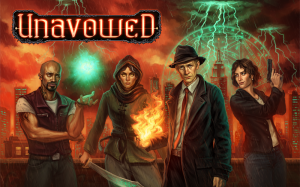
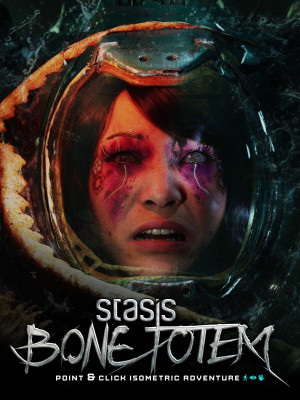

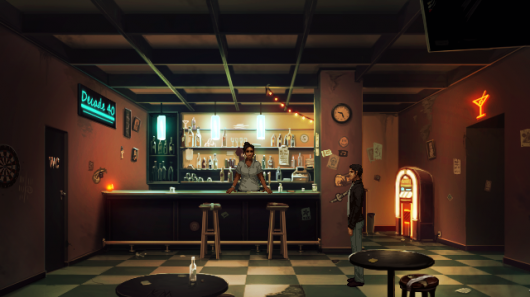










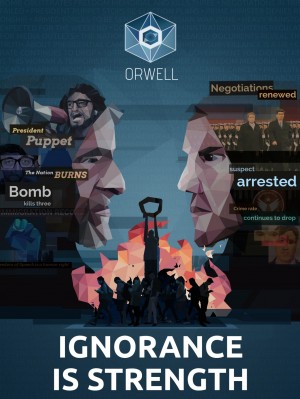


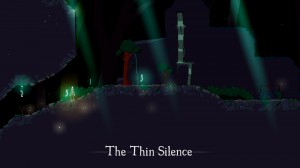

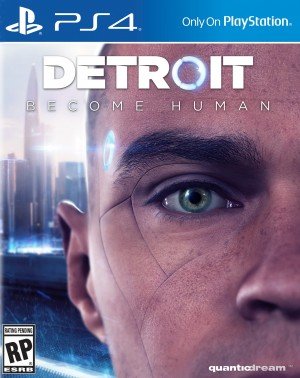
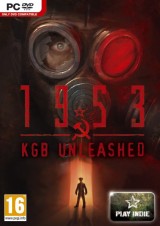

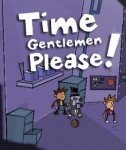




__small.jpg)

